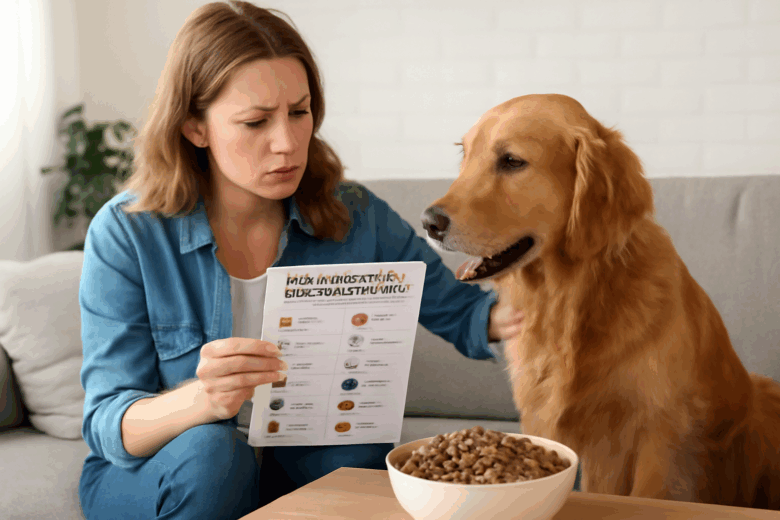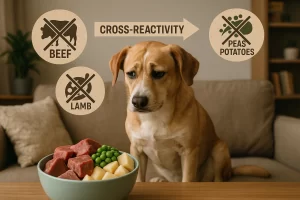Food allergies in dogs are more common than many pet owners realize, and they can lead to various health problems. Understanding which ingredients are causing these allergies and finding the right replacements is crucial for your dog’s health and well-being. In this article, we will explore the most common food allergens in dogs and provide alternatives to ensure your furry friend stays healthy and happy.
What Are Food Allergies in Dogs?
Food allergies occur when a dog’s immune system reacts to a specific ingredient in their food, treating it as a harmful substance. This causes various symptoms, including itching, gastrointestinal upset, and sometimes more severe reactions. Unlike food intolerances, which are more digestive in nature, food allergies involve the immune system and can lead to chronic issues if not managed properly.
How to Identify Food Allergies in Your Dog
Identifying food allergies in dogs can be challenging, as the symptoms may resemble other health issues. Common signs of food allergies include:
- Itchy skin (especially around the paws, ears, and face)
- Ear infections
- Vomiting or diarrhea
- Chronic gas or bloating
If your dog shows any of these symptoms after eating certain foods, it’s important to consult your vet for proper testing. A veterinarian can help pinpoint the allergens and guide you in choosing an appropriate diet.
Common Ingredients That Cause Food Allergies in Dogs
Several ingredients commonly found in commercial dog foods are known to cause allergic reactions. Here are 10 of the most frequent culprits:
1. Beef
Beef is one of the most common protein sources in dog foods and is also a major allergen. Dogs can develop sensitivities to beef, leading to skin irritations, gastrointestinal issues, and ear infections.
2. Chicken
Chicken is another popular protein that can cause allergic reactions in some dogs. The proteins in chicken can trigger immune responses in sensitive dogs, leading to similar symptoms as those caused by beef allergies.
3. Dairy
Dairy products contain lactose, which can be difficult for some dogs to digest. Dogs with lactose intolerance may experience bloating, diarrhea, or vomiting.
4. Wheat
Wheat and other gluten-containing grains are often used as fillers in dog foods. However, some dogs develop allergies to wheat, resulting in itching, ear infections, or gastrointestinal upset.
5. Soy
Soy is commonly used in pet foods as a plant-based protein. However, soy can cause allergic reactions in some dogs, leading to similar symptoms as those caused by other protein sources.
6. Corn
Corn is often used as a filler in dog foods and can be a common allergen. Some dogs may develop sensitivities to corn, resulting in itchy skin and digestive issues.
7. Eggs
Eggs are a rich source of protein, but they are also a common allergen for some dogs. Dogs with egg allergies may experience symptoms such as skin rashes and gastrointestinal upset.
8. Lamb
While lamb is often used in hypoallergenic diets, it can still cause allergic reactions in some dogs. Lamb allergies tend to be less common, but they can still lead to similar symptoms.
9. Fish
Although fish is often seen as a hypoallergenic protein, some dogs may develop sensitivities to certain types of fish, resulting in skin issues or digestive disturbances.
10. Artificial Additives and Preservatives
Artificial additives, flavors, and preservatives, such as BHA, BHT, and ethoxyquin, can trigger allergic reactions in dogs. These ingredients are commonly found in processed pet foods.
How to Replace Allergic Ingredients in Your Dog’s Diet
Once you’ve identified the allergens affecting your dog, it’s essential to replace them with healthier, safer alternatives. Here are some options for replacing common allergens:
Protein Alternatives
- Duck or Venison: Both are lean protein sources and often less likely to trigger allergies in dogs sensitive to more common proteins like beef or chicken.
- Fish (Salmon or Whitefish): Rich in omega-3 fatty acids, fish can be a great alternative for dogs with protein allergies. Be sure to choose a high-quality, non-artificially preserved source.
- Rabbit: Rabbit is a novel protein, meaning many dogs have never been exposed to it, reducing the likelihood of an allergic reaction.
Carbohydrate Alternatives
- Sweet Potatoes: A great source of fiber, vitamins, and minerals, sweet potatoes are a safe and nutritious alternative for dogs allergic to wheat or corn.
- Peas: Peas are a healthy carbohydrate that provides fiber and protein while being a good alternative for dogs with grain sensitivities.
- Pumpkin: Pumpkin is rich in fiber and is gentle on your dog’s stomach, making it an excellent alternative for dogs with grain or soy sensitivities.
How to Transition Your Dog to a New Diet
When transitioning your dog to a new diet, it’s important to do so gradually to avoid digestive upset. Start by mixing small amounts of the new food with the current food, gradually increasing the proportion of the new food over the course of a week. This will help your dog’s digestive system adjust without causing any discomfort.
Consulting Your Veterinarian: The Key to Managing Allergies
Managing food allergies in dogs requires careful monitoring and, in many cases, the guidance of a veterinarian. Your vet can help identify specific allergens, suggest the best dietary changes, and monitor your dog’s progress. Regular check-ups ensure your dog remains healthy and free from allergic reactions.
Conclusion: Keeping Your Dog Healthy with the Right Diet
In conclusion, food allergies in dogs can be managed effectively with the right knowledge and dietary adjustments. By identifying common allergens like beef, chicken, or wheat and replacing them with safe alternatives, you can ensure your dog remains happy and healthy. Always consult your vet before making significant changes to your dog’s diet, and keep an eye on any signs of allergies to address them promptly.



